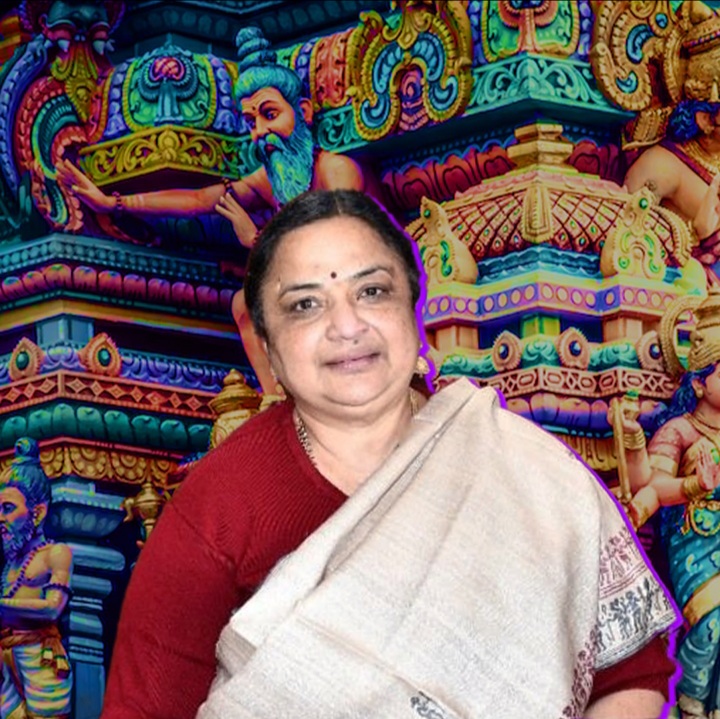'No God Is A Brahmin', First Woman VC Of JNU Criticises Regressive Ideas Of Caste
Writer: Laxmi Mohan Kumar
She is an aspiring journalist in the process of learning and unlearning many things. Always up for discussions on everything from popular culture to politics.
Delhi, 23 Aug 2022 11:39 AM GMT
Editor : Snehadri Sarkar |
While he is a massive sports fanatic, his interest also lies in mainstream news and nitpicking trending and less talked about everyday issues.
Creatives : Laxmi Mohan Kumar
She is an aspiring journalist in the process of learning and unlearning many things. Always up for discussions on everything from popular culture to politics.
Addressing an event at the B R Ambedkar Lecture Series, JNU VC Santishree Dhulipudi Pandit made comments in regard to the existing caste structure, where our gods belong in this structure anthropologically, and the many teachings from the architect of the Indian constitution.
Santishree Dhulipudi Pandit was appointed this year as the first woman Vice Chancellor of Jawaharlal Nehru University. She is known for her extensive research conducted across various topics, including international relations, Asian studies, culture and gender.
As she sets foot as the VC of the reputed institution, she has made it to the news for the thought-provoking comments she made during the recent BR Ambedkar Lecture Series organised by the Union Ministry of Social Justice and Empowerment. Attending the lecture series as the keynote speaker, she spoke on the topic "Dr B.R. Ambedkar's Thought on Gender Justice".
Looking Into The Origins Of Our Gods
Viewing the origin of gods from an anthropological and scientific perspective, Santishree said that "No god is a Brahmin". She elaborated, saying that Hindu Gods do not anthropologically come from the upper hierarchy of caste and the highest she has observed in the mythology is a Kshatriya. With the examples of Jagannath and Lord Shiva, she says that few gods themself belong to a Scheduled Caste or a Scheduled Tribe.
Supporting the statement, she refers to his demeanour which includes him sitting in a cemetery with a snake wrapped around his neck and very little clothing, reported Indian Express.
By saying that she doesn't think Brahmins can sit in the cemetery in a similar manner, she poses a question to the crowd as to why we continue to discriminate among humans.
To Be Done With The Casteist Notions For Good
Expressing her strong disapproval over archaic scriptures such as the "Manusmriti", she says that the text propagates "extraordinarily regressive" ideas. She refers to how the Manusmriti categorises all women as "Shudras" who can only claim to be a "Brahmin" by getting their husband or father's caste.
Talking about the inhuman casteist system, she mentioned the recent death of a nine-year-old Dalit boy in Rajasthan, who was beaten to death by an upper-caste teacher for touching their water. Condemning the incident, she asked how we could continue to treat a fellow human being in such a degrading and inhumane way.
Santishree believes the many teachings from Ambedkar's work, the "Annihilation of Caste", to be important. Tracing through it during the session. She expresses her confusion as to why people are emotionally attached to an artificially constructed idea that is very discriminatory in practice.
Adding on to it, she spoke about the intersection of caste and gender and said, "If you are a woman and you come from the reserved categories, you are doubly marginalised. First, you are marginalised because you are a woman, then you are marginalised because you come from a so-called caste, which is given all kinds of stereotypes."
In her concluding note, she mentions Buddhism to be a great practice which accommodates "dissent, diversity and difference". Calling Gautama the Buddha the first dissenter against Brahminical Hinduism and the first rationalist in history, she believes that Dr BR Ambedkar had revived a more accepting and rational tradition.
Also Read: 'Manusmriti Give Respectable Position To Indian Women': States Delhi HC Judge, Triggers Backlash
 All section
All section















